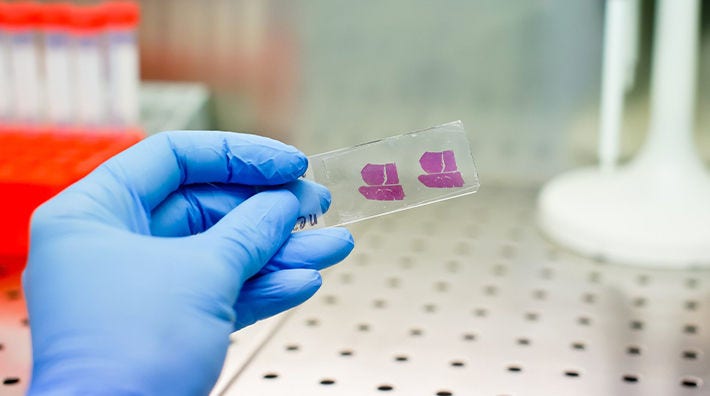Can Getting a Biopsy Make Cancer Spread?

If your doctor has recommended a biopsy to see whether you have cancer, you probably have a lot of questions. You may even be wondering can cancer spread if you do a biopsy?
The short answer to this question is that it’s extremely rare for cancer to spread during a biopsy. The benefits of getting a biopsy far outweigh the minimal risk of cancer spread.
Why is getting a biopsy important?
A biopsy is often the best way to say with certainty whether you have cancer. A biopsy is the removal of a small amount of tissue (sample) from a suspicious area to be evaluated under a microscope. Biopsy samples can be taken from almost any part of the body and used to help diagnose cancer.
Imaging tests, such as an ultrasound, computed tomography (CT) scan, or magnetic resonance imaging (MRI), can help the doctor tell if an area looks suspicious. But in most cases, the only way to make a definite cancer diagnosis is to perform a biopsy and look at those suspicious cells under a microscope.
There are different types of biopsies. Your doctor will help decide which type is best based on your condition and the location of the suspicious area in your body. They will most likely recommend the least invasive type first. Always ask your doctor why they recommend a specific type of biopsy for you.
“Biopsies often provide essential information to help diagnose and stage cancer. They can also help inform decision-making for individuals who receive a cancer diagnosis,” said Jeffrey E. Gershenwald, MD, FACS, an American Society of Clinical Oncology (ASCO) expert and professor in the Department of Surgical Oncology in the Division of Surgery at the University of Texas MD Anderson Cancer Center.
Do biopsies make cancer spread?
While cancer spread after a biopsy can technically happen, it’s important to remember that it’s extremely rare. When it does happen, it’s called “tumor seeding.” This process that occurs when the needle inserted into a tumor during the biopsy dislodges and spreads cancer cells. Tumor seeding may also be referred to as “needle tract seeding” because the cancer cells grow along the needle’s track.
Several studies have confirmed just how rare tumor seeding is. Here are just a few examples.
- A 2008 review showed that needle tract seeding occurred in just 2.7% of liver cancer biopsies.
- In a 2015 study, researchers reviewed previous studies and found that the incidence of needle tract seeding was less than 1%.
- A 2019 study followed 42 patients with bladder cancer who had a core needle biopsy. After following them for 28 months, no tumor seeding was found or reported.
- A 2024 review article looked at previous studies on tumor seeding from breast needle biopsies. It found that having a needle biopsy doesn't significantly affect the chances of breast cancer coming back, spreading to other parts of the body, or overall survival.
“If you have concerns about a biopsy, ask your doctor why they recommend the biopsy and what the risks of having or not having the biopsy are,” said Dr. Gershenwald.
Questions about biopsies to ask your doctor
You may also want to ask your doctor:
- How should I prepare for the biopsy?
- What will the procedure be like? Will there be any pain or discomfort?
- What are the possible complications of this type of biopsy?
- Can cancer be removed during a biopsy?
- Will the biopsy help find the cancer stage?
- What will recovery from the biopsy be like?
- Should I follow any special care instructions after the biopsy?
Dr. Gershenwald is a member of ASCO’s Patient Information Editorial Board. Read more about the collaboration between the American Cancer Society and ASCO on ASCO Patient Resources.
- Written by

Written by the American Society of Clinical Oncology (ASCO) with medical and editorial review by the American Cancer Society content team.


